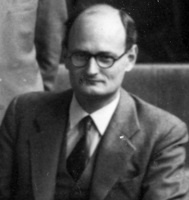R. M. Hare
R. M. Hare (Richard Mervyn Hare, 1919–2002) was an influential 20th-century British philosopher known for his work in ethics and moral philosophy. Hare is best known for his development of prescriptivism, a meta-ethical theory that analyzes the nature of moral language and moral reasoning. His work has had a significant impact on both analytic philosophy and applied ethics, influencing debates on a wide range of ethical issues.
Biography[edit | edit source]
Born in Backwell, Somerset, Hare served in the Royal Artillery during World War II, an experience that deeply influenced his philosophical views, particularly concerning the importance of moral decision-making. After the war, he returned to academic life, studying and then teaching at Balliol College, Oxford. Hare spent the latter part of his career at the University of Florida, where he continued to write and teach until his retirement.
Philosophical Work[edit | edit source]
Hare's philosophical work is characterized by a rigorous analysis of moral language, which he believed could provide insights into the nature of moral thinking and the structure of ethical arguments. His major contributions to philosophy include:
Prescriptivism[edit | edit source]
Hare's prescriptivism argues that moral statements are not merely expressions of feelings or attitudes but are prescriptive in nature, meaning they are intended to guide action. According to Hare, when we make moral judgments, we are prescribing actions not just for ourselves but for anyone in a similar situation. This universalizability principle is a cornerstone of his ethical theory.
Universal Prescriptivism[edit | edit source]
Expanding on his earlier work, Hare developed the concept of universal prescriptivism, which holds that moral judgments must be universalizable and prescriptive. This means that if one makes a moral judgment, one must be prepared to make the same judgment in any similar circumstance, regardless of who is involved.
Critique of Descriptivism[edit | edit source]
Hare was a strong critic of descriptivism in ethics, the view that moral language merely describes states of affairs or expresses emotions. He argued that moral language has a unique function, which is not adequately captured by descriptivist theories.
Applied Ethics[edit | edit source]
Beyond theoretical ethics, Hare applied his philosophical principles to practical issues, such as abortion, euthanasia, and the treatment of animals. He was particularly interested in how his theories could be applied to real-world moral dilemmas, demonstrating the practical relevance of his work.
Legacy[edit | edit source]
Hare's influence extends beyond the confines of academic philosophy. His work has implications for a wide range of disciplines, including law, political science, and economics, where his insights into moral reasoning and the nature of ethical language continue to resonate. Hare's commitment to the practical application of ethical theory has also inspired subsequent generations of philosophers to bridge the gap between theoretical ethics and practical moral problems.
Selected Works[edit | edit source]
- The Language of Morals (1952)
- Freedom and Reason (1963)
- Moral Thinking: Its Levels, Method, and Point (1981)
See Also[edit | edit source]
Navigation: Wellness - Encyclopedia - Health topics - Disease Index - Drugs - World Directory - Gray's Anatomy - Keto diet - Recipes
Search WikiMD
Ad.Tired of being Overweight? Try W8MD's physician weight loss program.
Semaglutide (Ozempic / Wegovy and Tirzepatide (Mounjaro / Zepbound) available.
Advertise on WikiMD
WikiMD is not a substitute for professional medical advice. See full disclaimer.
Credits:Most images are courtesy of Wikimedia commons, and templates Wikipedia, licensed under CC BY SA or similar.
Translate this page: - East Asian
中文,
日本,
한국어,
South Asian
हिन्दी,
தமிழ்,
తెలుగు,
Urdu,
ಕನ್ನಡ,
Southeast Asian
Indonesian,
Vietnamese,
Thai,
မြန်မာဘာသာ,
বাংলা
European
español,
Deutsch,
français,
Greek,
português do Brasil,
polski,
română,
русский,
Nederlands,
norsk,
svenska,
suomi,
Italian
Middle Eastern & African
عربى,
Turkish,
Persian,
Hebrew,
Afrikaans,
isiZulu,
Kiswahili,
Other
Bulgarian,
Hungarian,
Czech,
Swedish,
മലയാളം,
मराठी,
ਪੰਜਾਬੀ,
ગુજરાતી,
Portuguese,
Ukrainian
Contributors: Prab R. Tumpati, MD

